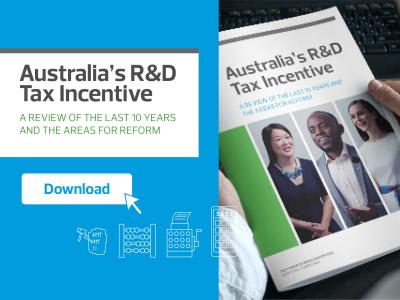Accessing the R&D Tax Incentive
Are you an entrepreneur or business owner that strives for innovation through R&D?
Research and development (R&D) is a critical step in innovation, and the R&D Tax Incentive is a significant driver of innovation in Australia, encouraging companies to undertake R&D activities they might not otherwise be able to fund.
R&D can be a risky and expensive undertaking, particularly for small businesses and entrepreneurs who may have limited resources and financial support.
The Research and Development (R&D) Tax Incentive (RDTI), is a government-assistance program that can give your Australian business up to 43.5% cash back to help mitigate some of this risk and cost.
Many companies are unaware of the R&D incentive and the financial benefits it provides. Others simply do not have the in-house capabilities to make a claim.
This is where the tax specialists at RSM can assist.

DID YOU KNOW?
The size of the R&D offset is determined by the entity's aggregated turnover.
UNDER $20 MILLION AGGREGATED TURNOVER
Entitles the entity to a refundable R&D tax offset calculated as tax rate + 18.5%. This equals 43.5% for companies on a 25% corporate tax rate. This means profitable entities pay less tax and entities making a loss will get a cash refund.
OVER $20 MILLION AGGREGATED TURNOVER
Entitles the entity to a non-refundable R&D tax offset that can reduce its tax liability or be carried forward to future periods. Depending on your ‘R&D intensity’, the incremental R&D benefit range from 8.5% to 16.5%.

Research and development tax incentive commonly asked questions:
Our tax advisers have extensive experience in successfully preparing applications and obtaining R&D benefits for activities undertaken to acquire new knowledge; or information in relation to new or improved materials, products, devices, processes or services.
Here is a few commonly asked questions to get you started:
Aggregated turnover of less than $20 million
For R&D entities with an aggregated turnover of less than $20 million, the refundable R&D tax offset is your corporate tax rate plus an 18.5% premium.
Aggregated turnover of $20 million or more
For R&D entities with an aggregated turnover of $20 million or more, the non-refundable R&D tax offset is your corporate tax rate plus an incremental premium.
The premium increments are based on your R&D Intensity. This is a calculated percentage based on your eligible R&D expenditure as proportion of your total P&L expenditure + any accounting capital R&D expenditure for the year.
All eligible R&D expenditures up to 2% R&D Intensity will receive a non-refundable R&D tax offset equal to your corporate tax rate plus an 8.5% premium.
Additional eligible R&D expenditure above 2% R&D Intensity will receive a non-refundable R&D tax offset of your corporate tax rate plus a 16.5% premium.
If you are conducting R&D activities, you may be eligible to claim an R&D tax offset under the R&D tax incentive.
The R&D Tax Incentive is broad-based support across most industries, however there are some industries which have exceptions. As long as a company (in any industry) meets the R&D eligibility criteria, then it can claim the R&D incentive.
You should assess whether you, and the activities you are conducting, qualify for a claim under the R&D tax incentive. To help you do this, we have set out the 6 steps you need to take to work out if you can claim and, if so, how much.
Some common industries that we see claiming the R&D incentive include Biotechnology, Technology / Software, Mining, Engineering, and Life Sciences.
Each R&D activity will have of one or more actions that you must complete to achieve an activity outcome.
The program supports R&D activities that can be shown to follow a set of specific actions. These actions must meet the requirements set out in the definition of an eligible R&D activity.
The definition of an eligible R&D activity under the R&DTI
Eligible R&D activities are defined in the legislation that underpins the program. Division 355 of the Income Tax Assessment Act 1997 identifies eligible activities as either core R&D activities or supporting R&D activities.
Core R&D activities
Core R&D activities are experimental activities:
- Whose outcome cannot be known or determined in advance on the basis of current knowledge, information or experience, but can only be determined by applying a systematic progression of work that:
- is based on principles of established science; and
- proceeds from hypothesis to experiment, observation and evaluation, and leads to logical conclusions; and
- That are conducted for the purpose of generating new knowledge (including new knowledge in the form of new or improved materials, products, devices, processes or services).
Supporting R&D activities
Supporting R&D activities are activities directly related to* core R&D activities.
Get in touch with a Research and Development Tax Incentive expert
Your local R&D Tax Incentive experts in Perth
Simon Harcombe

Simon Harcombe, based in our Perth office, serves as a principal in our Tax Services division, specialising in R&D tax incentive consulting with over 15 years of experience.
Simon has provided expert R&D tax advice across diverse Australian industries, including resources, technology, and biotechnology. Simon's expertise extends beyond R&D tax, encompassing corporate finance within major infrastructure projects. He offers a comprehensive understanding of the R&D claims process, including eligible expenditure calculations, analysis of complex R&D tax issues, regulatory consultations, and the implementation of effective R&D management practices.
LEARN MORE >>









